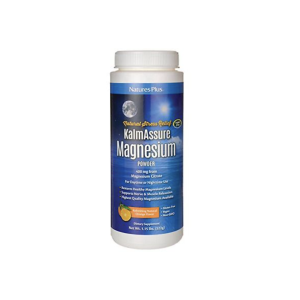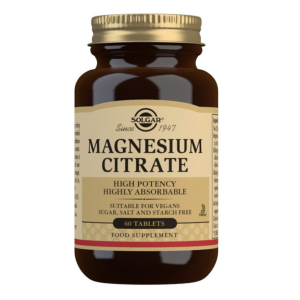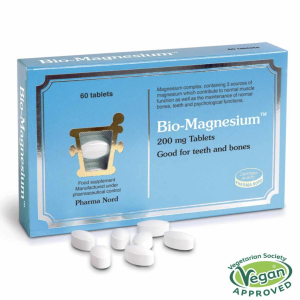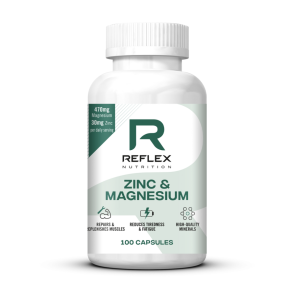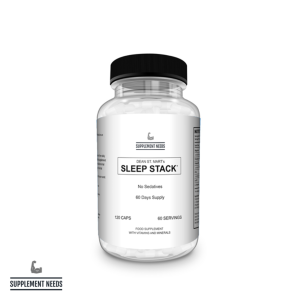We use cookies to make your experience better. We and our advertising partners collect data and use cookies for ad personalization and measurement. To comply with the new e-Privacy directive, we need to ask for your consent to set the cookies.Learn how we collect and use data Learn more.
Free Delivery on orders over £50 Free Click & Collect
Did You Know: How Much Magnesium You Should Take Per Day?
In today's fast-paced world, maintaining a balanced diet and ensuring you get all the necessary nutrients is essential for your overall health. Magnesium, a vital mineral, plays a crucial role in various bodily functions. But how much magnesium do you need daily? In this comprehensive guide, we will explore the importance of magnesium, its sources, and the recommended daily intake to help you maintain optimal health.
What Is Magnesium
Magnesium is an essential mineral required for numerous physiological processes in the body. It is involved in more than 300 enzymatic reactions, making it vital for maintaining overall health and well-being. Magnesium is necessary for the proper functioning of muscles, nerves, and the heart. It also contributes to bone health, energy production, and maintaining blood pressure.
Magnesium Sources
Natural Food Sources
Magnesium can be found in various foods, including leafy greens, nuts, seeds, and whole grains. Incorporating these into your diet is a natural way to boost your magnesium intake.
Supplements
If you struggle to meet your daily magnesium needs through food alone, supplements are a convenient option. Consult with a healthcare professional before starting any supplementation.
Recommended Daily Intake
The recommended daily intake of magnesium varies based on age and gender. Adult males typically require more magnesium than adult females.
Health Benefits of Adequate Magnesium
Adequate magnesium intake is crucial for maintaining overall health and well-being. This essential mineral is involved in various bodily functions and can offer numerous health benefits when consumed in the right amounts. Here's a closer look at how sufficient magnesium intake can positively impact your health:
1. Heart Health:
- Blood Pressure Regulation: Magnesium plays a key role in regulating blood pressure. It helps relax blood vessels, promoting healthy blood flow and potentially reducing the risk of hypertension (high blood pressure).
- Cardiovascular Health: Adequate magnesium intake has been linked to a lower risk of cardiovascular diseases, including heart attacks and strokes.
2. Bone Health:
- Bone Density: Magnesium is essential for maintaining bone density and bone structure. It works alongside calcium and vitamin D to support healthy bones and may help prevent osteoporosis.
3. Muscle Function:
- Muscle Relaxation: Muscles require magnesium to contract and relax properly. This mineral can help reduce muscle cramps and spasms, making it important for athletes and those with muscle-related issues.
4. Mental Well-being:
- Mood Stabilisation: Magnesium may play a role in stabilising mood and reducing symptoms of depression and anxiety. It is thought to influence neurotransmitter pathways related to mood regulation.
Recommended Dietary Allowance (RDA) for Magnesium
The Recommended Dietary Allowance (RDA) is a guideline that indicates the daily intake of a specific nutrient needed to meet the nutritional requirements of most individuals within a particular age and gender group. For magnesium, the RDA varies based on age, gender, and specific life stages. Here are the recommended daily allowances for magnesium:
Adults 19-51+ Years
- Men: The RDA for adult men in this age group is approximately 400-420 mg of magnesium per day.
- Women: Adult women in the same age range are advised to consume around 310-320 mg of magnesium daily.
Pregnancy
During pregnancy, a woman's magnesium requirements increase to support the developing fetus and the changes in her body. The RDA for magnesium during pregnancy is about 350-360 mg per day.
Source: https://www.hsph.harvard.edu/nutritionsource/magnesium/
Signs of Magnesium Deficiency
Magnesium is a vital mineral that participates in numerous bodily functions, and its deficiency can lead to various health issues. Recognising the signs of magnesium deficiency is essential for maintaining your well-being. Here are common signs and symptoms that may indicate you are not getting enough magnesium:
1. Muscle Cramps and Spasms:
One of the most noticeable signs of magnesium deficiency is muscle cramps and spasms. These can occur in various muscle groups and may range from mild discomfort to painful contractions.
2. Fatigue and Weakness:
Low magnesium levels can contribute to overall fatigue and weakness, making everyday activities more challenging. You may feel tired even after getting adequate rest.
3. Abnormal Heart Rhythms:
Magnesium is crucial for maintaining a regular heartbeat. A deficiency can lead to palpitations, arrhythmias, or an irregular pulse.
Factors Affecting Magnesium Absorption
Magnesium absorption is a complex process influenced by several factors. Understanding these factors can help you optimise your magnesium intake and ensure your body receives the necessary amount of this essential mineral. Here are the key factors affecting magnesium absorption:
1. Dietary Intake:
The magnesium content of your diet plays a significant role in absorption. Foods rich in magnesium, such as leafy greens, nuts, seeds, and whole grains, provide a readily absorbable form of the mineral. Consuming a diverse range of magnesium-rich foods can enhance absorption.
2. Vitamin D:
Vitamin D is essential for magnesium absorption in the intestines. Adequate exposure to sunlight or vitamin D supplementation can help improve magnesium absorption. Without sufficient vitamin D, your body may struggle to utilise magnesium effectively.
3. Calcium Levels:
The balance between magnesium and calcium is crucial for absorption. Excessive calcium intake, especially from supplements, can hinder magnesium absorption. Maintaining an appropriate ratio of calcium to magnesium in your diet is essential for both minerals' effective utilisation.
How to Incorporate More Magnesium into Your Diet
Incorporating more magnesium into your diet is essential to maintain optimal health and well-being. This vital mineral is involved in various bodily functions, and ensuring you get enough of it can be achieved through smart dietary choices. Here's some ways on how to increase your magnesium intake naturally:
Eat Magnesium-Rich Foods
- Leafy Greens: Spinach, kale, and Swiss chard are excellent sources of magnesium. Incorporate them into salads, smoothies, or sautés.
- Nuts and Seeds: Almonds, cashews, pumpkin seeds, and sunflower seeds are magnesium-packed snacks. Enjoy them as a quick and healthy munch.
- Whole Grains: Opt for whole grains like brown rice, quinoa, and whole wheat bread instead of refined grains.
- Legumes: Beans, lentils, and chickpeas are not only rich in fiber but also provide a good dose of magnesium.
Include Fatty Fish
Fish like salmon and mackerel are not only delicious but also rich in magnesium. Grill or bake them for a tasty and nutritious meal.
Consider Magnesium Supplements
If you have specific dietary restrictions or are unable to meet your magnesium needs through food alone, consult with a healthcare professional about magnesium supplements.
Top 5 Magnesium Supplements Available in the UK
Now, let's delve into the top magnesium supplements available in the UK market!
Nature's Plus KalmAssure Magnesium Powder
Nature's Plus KalmAssure Magnesium Powder delivers 400 mg of natural, calming, essential magnesium in highly bioavailable citrate form.
Solgar Magnesium Citrate
Solgar Magnesium Citrate is a worldwide best-selling magnesium product. Available in a citrate form, this highly absorbable form of magnesium, their formula supports the nervous system, energy release and muscle function.
Pharma Nord Bio-Magnesium
Magnesium supplements from Pharma Nord contain a complex of three different Magnesium compounds: acetate, hydroxide and carbonate. This ensures good bioavailability and is gentle on the gut.
Reflex Zinc & Magnesium
This Zinc & Magnesium combo helps to repair and replenish the body from intense exercise by supporting muscle function, protein synthesis and reduce tiredness and fatigue.
Supplement Needs Sleep Stack
Sleep Stack is a fully transparent supplement containing 6 ingredients at efficacious doses. Formulated with magnesium to complement the biochemistry of sleep to support falling asleep, and staying asleep.
Nutrition Now is one of the UK's and Ireland's largest discount supplement store. We stock amazing brands at great prices online. Make sure to check our complete range of magnesium supplements.
Conclusion
In conclusion, understanding how much magnesium per day is necessary toward maintaining good health. By following the recommended daily intake guidelines and incorporating magnesium-rich foods into your diet, you can enjoy the many health benefits this essential mineral offers. If you have specific health concerns or conditions, consult with a healthcare professional for personaliaed guidance on your magnesium needs.
FAQs
Q1: Can I get enough magnesium from food alone?
Yes, it's possible to meet your magnesium needs through a well-balanced diet rich in magnesium-containing foods.
Q2: Are there any side effects of magnesium supplements?
When taken as directed, magnesium supplements are generally safe. However, excessive intake can lead to digestive issues.
Q3: What foods are high in magnesium?
Foods such as spinach, almonds, avocados, and whole grains are excellent sources of magnesium.
Q4: Is it possible to overdose on magnesium?
Overdosing on magnesium from food sources is unlikely. However, it's crucial to follow dosage instructions for supplements.
Q5: Can magnesium help with sleep problems?
Magnesium may contribute to better sleep quality by promoting relaxation and reducing stress.


